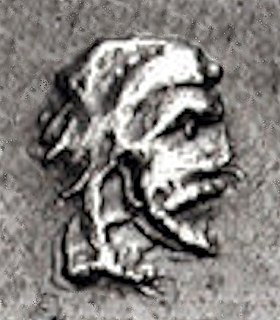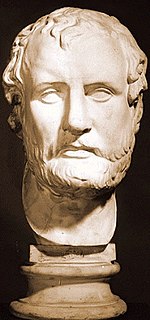Epigenes of Athens (Greek : Ἐπιγένης ὁ Ἀθηναῖος, c. 4th century BC) was an Athenian comic poet of the middle comedy.

Greek is an independent branch of the Indo-European family of languages, native to Greece, Cyprus and other parts of the Eastern Mediterranean and the Black Sea. It has the longest documented history of any living Indo-European language, spanning more than 3000 years of written records. Its writing system has been the Greek alphabet for the major part of its history; other systems, such as Linear B and the Cypriot syllabary, were used previously. The alphabet arose from the Phoenician script and was in turn the basis of the Latin, Cyrillic, Armenian, Coptic, Gothic, and many other writing systems.

The city of Athens during the classical period of Ancient Greece was the major urban center of the notable polis (city-state) of the same name, located in Attica, Greece, leading the Delian League in the Peloponnesian War against Sparta and the Peloponnesian League. Athenian democracy was established in 508 BC under Cleisthenes following the tyranny of Isagoras. This system remained remarkably stable, and with a few brief interruptions remained in place for 180 years, until 322 BC. The peak of Athenian hegemony was achieved in the 440s to 430s BC, known as the Age of Pericles.

Ancient Greek comedy was one of the final three principal dramatic forms in the theatre of classical Greece. Athenian comedy is conventionally divided into three periods: Old Comedy, Middle Comedy, and New Comedy. Old Comedy survives today largely in the form of the eleven surviving plays of Aristophanes, while Middle Comedy is largely lost, i.e. preserved only in relatively short fragments by authors such as Athenaeus of Naucratis. New Comedy is known primarily from the substantial papyrus fragments of Menander.
Pollux indeed [1] speaks of him as neôn tis kômikôn, but the terms "middle" and "new," as Clinton remarks, [2] are not always very carefully applied. [3] Epigenes himself, in a fragment of his play called The Little Tomb (Mnêmation) [4] speaks of Pixodarus, prince of Caria, as "the king's son"; and from this Meineke argues [5] that the comedy in question must have been written while Hecatomnus, the father of Pixodarus, was yet alive, and perhaps about 380 BC. We find besides in Athenaeus, [6] that there was a doubt among the ancients whether the play called Disappearance of the Money (Argyrion Aphanismos) should be assigned to Epigenes or Antiphanes. These poets therefore must have been contemporaries. The Suda mentions two other plays written by Epigenes: Heroine and Revelry. [7]
Julius Pollux was a Greek scholar and rhetorician from Naucratis, Ancient Egypt. grammarian and sophist, scholar and rhetorician, 2nd century AD, from Naukratis, Egypt. Emperor Commodus appointed him a professor-chair of rhetoric in Athens at the Academy — on account of his melodious voice, according to Philostratus' Lives of the Sophists.

Pixodarus or Pixodaros, was a ruler of Caria, nominally the Achaemenid Empire Satrap, who enjoyed the status of king or dynast by virtue of the powerful position his predecessors of the House of Hecatomnus created when they succeeded the assassinated Persian Satrap Tissaphernes in the Carian satrapy. Lycia was also ruled by the Carian dynasts since the time of Mausolus, and the name of Pixodarus as ruler appears in the Xanthos trilingual inscription in Lycia.

Caria was a region of western Anatolia extending along the coast from mid-Ionia (Mycale) south to Lycia and east to Phrygia. The Ionian and Dorian Greeks colonized the west of it and joined the Carian population in forming Greek-dominated states there. The inhabitants of Caria, known as Carians, had arrived there before the Ionian and Dorian Greeks. They were described by Herodotus as being of Minoan Greek descent, while the Carians themselves maintained that they were Anatolian mainlanders intensely engaged in seafaring and were akin to the Mysians and the Lydians. The Carians did speak an Anatolian language, known as Carian, which does not necessarily reflect their geographic origin, as Anatolian once may have been widespread. Also closely associated with the Carians were the Leleges, which could be an earlier name for Carians or for a people who had preceded them in the region and continued to exist as part of their society in a reputedly second-class status.
The fragments of the comedies of Epigenes have been collected by Meineke [8] and Kock. [9]


